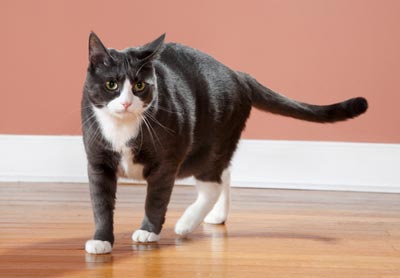My Cat Is Pacing All Night: What's Up?

If you have a cat that is up pacing all night while you're trying to sleep, you might be getting frustrated. It's easy to think that your cat is acting spitefully; trying to keep you up because you're spending too much time at work or not giving her enough treats. The fact is that there might be a more sinister reason for the development of night-time pacing in your feline companion.
Reasons for a Sudden Development of Night-time Pacing in Cats
If your cat suddenly begins pacing, perhaps even meowing, at night, one of the following might be the culprit:
- Hyperthyroidism is a common cause of this behavior in cats. When the thyroid is overactive, the kitty's metabolism is revved up, and she is extra hungry and may also be feeling hyperactive or anxious. All of these feelings can lead to a cat that is unable to rest or stay still like she usually would. You can learn more here: "Hyperthyroidism in Cats."
-
Cognitive dysfunction or another brain disorder can cause day and night reversal. Older cats can develop senility, and one of this disorder's hallmark signs is the confusion of day and night, leaving them up and looking for something to do all night and sleeping all day. Senile cats may also forget where their food and water bowls are and spend a lot of time yowling in confusion. Other conditions that affect the brain can also cause these signs.
- Anxiety and stress can cause pacing at night. Cats that are anxious or stressed about something may not be able to settle down and relax. If something is new in your household and it correlates with the beginning of the night-time pacing behavior in your cat, anxiety might be the cause.
- Pain can cause an inability to rest. Certain types of pain can cause a cat to be unable to lie down comfortably or might keep her awake.
- Boredom can cause night-time pacing. If your cat doesn't get enough interaction, playtime, and stimulation during the day, she might be up all night. This is especially the case for young, healthy cats. Felines are corpuscular animals, meaning they are usually most active at the twilight times of dusk and dawn, so it can take time for them to adjust to our human schedule. You can learn more about this cause of night-time wakefulness in cats here: "How to Train Your Cat to Let You Sleep."
Diagnosis of Night-time Pacing in Cats
If your cat suddenly begins pacing or meowing at night, the first thing to do is take her to the veterinarian. A thorough physical exam should reveal any sources of pain. The doctor will also take a thorough history from you and use it, as well as your cat's age and any other medical conditions, to determine the most likely cause of the pacing. Blood work might be recommended to check for hyperthyroidism and to evaluate general health.
Treatment of Nocturnal Pacing in Cats
The treatment for a cat's night-time pacing will depend on its cause. The main thing to keep in mind while your veterinarian is diagnosing the condition and formulating a treatment plan is to remain patient. Regardless of the cause, your kitty isn't trying to make you miserable.
You May Also Like These Articles:
Why Do Cats Purr? The How & Why of Cat Purring
Cat Myths: Separating Fact from Fiction
Stop Doing These Things to Your Cat Right Now
Notice: Ask-a-Vet is an affiliated service for those who wish to speak with a veterinary professional about their pet's specific condition. Initially, a bot will ask questions to determine the general nature of your concern. Then, you will be transferred to a human. There is a charge for the service if you choose to connect to a veterinarian. Ask-a-Vet is not manned by the staff or owners of CatHealth.com, and the advice given should not delay or replace a visit to your veterinarian.




